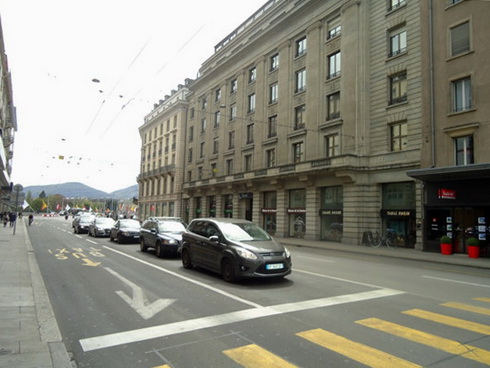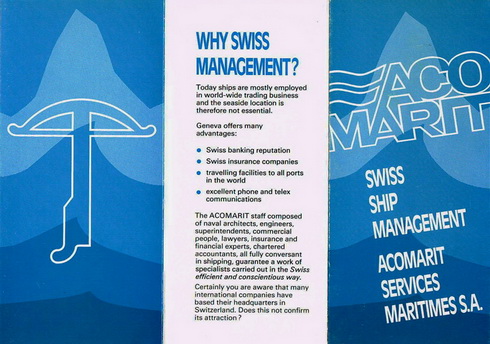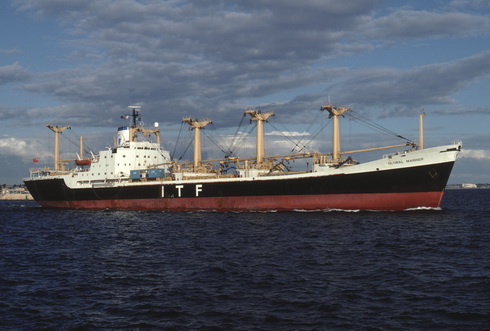
HISTORY OF ACOMARIT SERVICES MARITIMES SA GENEVA
![]()
![]()
Acomarit Services Maritimes S.A. Geneva was founded in 1967 as a Ship Management and Consulting Company, the main shareholder being the Overland Trust Bank, Lugano (later taken over by another bank). The founder was Captain Giorgio Sulser (born 1938), a citizen of Ticino, the Italian-speaking part of Switzerland. After completing an apprenticeship in the banking industry, he went to sea in 1958 on vessels of Suisse-Atlantique S.A. Lausanne, working his way up to Chief Officer. Then he left the company and became Master on tweendeckers of 12’000 DWT. In 1967 he decided to come onshore and commenced working for the Overland Trust Bank in Lugano, where shortly after joining, one of the bank's clients asked the bank for assistance to manage his vessels – the birth of Acomarit.
Mr Sulser decided to open Acomarit's first office in Geneva at No. 15, Rue du Jeu-de-l’Arc. The actual operation started with 5 ships from an Italian owner, two bulkcarriers and 3 tankers named SPLENDID BREEZE, SPLENDID ARROW, SPLENDID DIAMOND etc. At first Mr Sulser was assisted by operational, technical and financial directors, Mr Willy Kilchenmann, Ing. Alberto Tence and Mr Georges Semboglou.

Captain Giorgio Sulser
Initially crewmembers on these vessels were mainly of Spanish nationality, however as far as possible, Swiss crewmembers were engaged, including some officers. Through time a number of the Swiss officers having served onboard the Acomarit-managed vessels or having gained experience on board other vessels, were employed in the Geneva office as Crewing Manager, Technical Manager, Superintendents or ship’s operators, namely Capt Jacques Bille, Mr. Ernst Tschopp, Mr. Pedro Zurcher, Mr. Hans Tanner, Mr. Kurt Burkart, Mr. Robert Rohrbach, Captain Robert Sauter, Mr. Mathieu Baehni and others.
The company’s policy was to employ as many Swiss seamen as possible, but as the fleet increased in size, it was necessary to find other sources of crew, the first crews were Spanish, later on Yugoslavs/Croatians were employed, to be followed by Philippinos and after 1991 by a large number of officers and seamen from the FSU, the former Soviet Union.
The size of the managed-fleet grew steadily - in 1978 the Head Office was moved to No. 3, Rue du Mt Blanc and later to No. 21-23, Rue du Clos in Geneva. The Acomarit Group, with head office in Geneva, in just over 30 years of operation, had expanded to become one of the world’s largest, progressive, highly regarded and, in many spheres leading ship management companies. The Group then consisted of an international network with offices in Glasgow, Singapore, Piraeus, Oslo, Limassol, Montreal and crew recruiting offices in Rijeka, Riga, Novorossiysk, Odessa, Hongkong, Mumbai and Manila. These offices, the largest of which was in Glasgow provided the whole Group with not only additional ship management capability, but also specialist technical and operational support, purchasing of stores and spares, freight collection and post-fixtures services, chartering and crewing services. Financial and insurance services were also provided as and when required.

The office of Acomarit at 3, Rue du Mont-Blanc, in the back thebridge across the Rhone and the Mont Salève
In 1982, Mr Sulser created another shipping company, Massoel S.A, Fribourg, owners of swiss-flagged vessels, managed by Acomarit Geneva. The operation started with the purchase of a small bulker of 3’500 DWT and 37 years later (2019) the fleet consists of 8 geared bulkers ranging from 20’000 DWT to 50’000 DWT. On these vessels, the owners required Acomarit to employ as many Swiss seamen as possible, however, due to the practicalities of finding sufficient suitably qualified Swiss seamen, where unable to employ more than about one third of the crew of Swiss nationality. Some Captains were Swiss (Paul Accola, Daniel Mermoud, Gion Wetten), the only Swiss female deck officer, 2nd Officer Marieta Kuntz was employed aboard the LUGANO. As of date, there are no more Swiss on board the vessels, the crews being a mix of Croatians, Ukrainians and Philippinos. (After the merger between Acomarit and V.Ships and the move from the Geneva office to the V.Ships Monaco office in 2008, Massoel opened their own management office in Geneva, - see the last paragraph).
In 1990 new business opportunities opened up when the Soviet Union disintegrated, in fact in December 1991, the CIS Commonwealth of Independent States replaced the former Soviet Union. In 1991 Acomarit entered into a joint venture with the Russian State Company “Sovcomflot” to manage many former Soviet vessels, tankers, gas carriers and bulkers under the Cyprus flag, while still employing the same ex-Soviet officers and crewmembers. This new venture gave to Acomarit access to a considerable pool of well trained and qualified ex-Soviet crewmembers, who were later employed on vessels other than the ex-Soviet fleet and were provided to other international owners. In 1991 a new company “Unicom” was formed by Acomarit Geneva and Sovcomflot and set up offices in Limassol, Cyprus. In 1995 the company “Unicom” took over all the Sovcomflot ships.
With "The Art and Science of Shipmanagement" as a guiding vision, the fleet managed by the Acomarit organization grew steadily to about 240 vessels. Ships of all types and sizes, including tankers, OBOs, chemical tankers, bulkers, geared bulkers, containers ships, RORO ships, car carriers, bunkering barges, reefer vessels, leisure vessels etc for numerous international owners. It is worth noting that Acomarit in Geneva managed three of the largest tankers afloat for more then 10 years, vessels of 404’000 DWT each. Apart from the Swiss fleet (Massoel) flying a “national flag” the majority of vessels in management operated under various "flags of convenience”.

Cover of an early Acomarit brochure
(Ernst Tschopp)
One of the highlights of Acomarit Geneva was to obtain the technical management, for about 18 months, of the British-built, British-flag tweendecker GLOBAL MARINER, purchased and owned by the ITF, the International Transport Workers’ Federation. The vessel was purchased 2nd hand in Korea, spent few weeks in a shipyard in Korea to prepare a safe access to the holds for the expected public-interest that the vessel would generate. The ITF objective was to present in ports around the world, an important exhibition well presented in the five holds, denouncing the living conditions of the seamen on board “flag-of-convenience” *) vessels and about the topic of these flags more generally. The GLOBAL MARINER sailed from Korea to London and from there, started on 08.07.1998 a world tour with a full British crew, calling about 70 ports with its exhibitions, which were seen by a large, international public audience. The vessel returned to London at the end of its exhibition tour, was then employed commercially.

GLOBAL MARINER
Bildherkunft / Photosource: SwissShips / MB-Collection
The company “SeaTec” was originally formed in 1987 as Acomarit Consulting / Cargo Analytics to provide independent on board safety assessments and safety training, ship inspections, superintendency services such as dry-docking and repairs, tanker pre-vetting inspections for the Acomarit-managed fleet and eventually other owner's vessels of wet and dry cargo ships.
Introduction of QA (Quality Assurance) to joint DNV and ISO standards was initiated by the Group and Acomarit were the first management company to achieve this joint standard. QA was subsequently successfully implemented in all international offices and onboard all managed-ships even before the date, when these new rules became mandatory requirements.
Another milestone was the creation of the Acomarit e-management software “ShipSure” linking ships, owners and managers for better communication and quick decision-making. ShipSure was used for ship to shore data transfer, planned maintenance, purchasing, accounting, crewing and most aspects of ship management.
The MARINE CONTRACTING ASSOCIATION, “MARCAS” was established in 1999 by the Acomarit Group. This company was a joint collaboration with two like-minded large private ship owners. It was agreed to establish its operating office in Geneva. With the combined vessels of the three companies MARCAS could aggregate purchasing volumes and obtain industry beating contracts for their members. Its tasks were to negotiate globally with reputable and leading ship-suppliers of goods and services to obtain and provide to the MARCAS-members the keenest market pricing. Such suppliers were contracted for the supply of spare parts, equipment, lubricating oils, paints, cleaning and treatment chemicals, consumable stores, etc. and as well with dry-docking companies.
In January 2001, the Acomarit Group and the V.Ships Group (Vlasov), two of the world’s leading ship management companies, merged. Acomarit Geneva became V.Ships Switzerland S.A. After the merger, Mr. Giorgio Sulser was appointed as Chairman of the board of directors of the V.Ships Group for next three years. This new company had 20 offices around the world, a fleet of over 600 ships, manned by about 25'000 seafarers.
After the merger of the two companies, some re-organisation was found necessary and the office of V.Ships Switzerland S.A. was closed at the end of 2008, to be integrated with V.Ships Monaco. Some of the ex Acomarit / V.Ships Switzerland staff moved to work from the V.Ships Head office in Monaco. The company V.Ships still flourishes today (2019) but has no more activities in Switzerland.
KB April 7, 2019
*) General remark:
The term "flag of convenience" most probably was introduced by the unions and is used for the flags of Panama, Liberia, Marshall Islands etc. The word was of course taken up by the journalists with enthusiasm. Obviously there are ships under these flags, which deserve to be called "cheap" if one considers wages, living- and working conditions for the crew. However many shipping companies, which use these flags for various reasons, offer better wages and conditions, then certain Swiss flag companies.